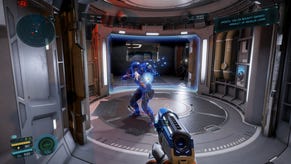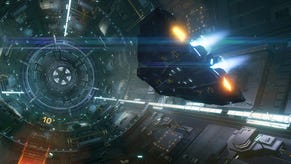Elite Dangerous: Braben's square peg
Elite: Dangerous is the long-awaited space trading game from industry legend David Braben. VG247's Dave Cook asks him about the game's galaxy, multiplayer and more.
“Elite was a truly stunning display of technical mastery, and fans have been calling out for Braben and his studio Frontier Developments to return to the series since the last game in the series Frontier: First Encounters launched in 1995.”
I want to try an experiment here before I kick off the interview. Open up a new web browser tab and look at your email inbox. Now pick any email in there and check to see what the file size of the message is, including any attachments enclosed.
Chances are you're looking at something around the 8k mark for plain text emails, or anywhere from 30k to a few MB for messages with images attached. Now here's a little fact for you: David Braben and Ian Bell's original Elite was only 22k in size when it launched on BBC Micro in 1984.
If that's not so impressive, then know that it is considered by many to the be the world's first truly open world game, even though it was pre-dated by 1974's Star Trader which focused on interstellar commerce, but followed a different format.
Despite its size Elite managed to fit a square peg in a round hole, delivering an impressive 256 planets in such a small file size, all procedurally generated with their own global economy and abiding by laws of science. You start the game with a relatively weak Cobra Mark III trading ship, 100 credits and venture forth into a vast galaxy teeming with possibilities.
You are then free to do as you please, much in the same way that EvE Online or DayZ allows today - but without the MMO leanings - meaning that there is no ending as such, just the freedom to create your own role in the wider world. Coming at a time where platformers were all the rage, it's little wonder that Elite stood out from the crowd.
Elite was a truly stunning display of technical mastery, and fans have been calling out for Braben and his studio Frontier Developments to return to the series since the last game in the series Frontier: First Encounters launched in 1995.
Although it's been a long time coming, the recently-announced Elite: Dangerous is the game fans have been waiting for, and it's currently lighting up Kickstarter in a big way, sitting at £533,985 of its £1,250,000 goal at the time of writing. Clearly the series still has its fans and that, in turn, places pressure on Braben and his team to deliver.
It's refreshing that, in this time of big budget development and cinematic, aural nightmares, Braben has stuck to a simple open world premise. The format remains unchanged as the threadbare game synopsis suggests, "Take a ship and 100 credits to make money legally or illegally - trade, bounty-hunt, pirate, assassinate your way across the galaxy."
While it's a simple concept it also offers a wealth of possibility, given the sheer scale of the galaxy being proposed. We spoke with Braben to learn more about what those propositions will mean to the player, and to shed new light on his ambitious project.
Naturally our first question to Braben is why the game has taken so long to surface, and why Kickstarter is being used instead of a big publisher. After all, if EvE Online can succeed, then why not Elite, the game widely regarded as a godfather of the space trading genre?
“The danger is that everyone has their own idea of what the next Elite should be. The question is: if those ideas are very different to each other, then it’s going to be very hard to try and deliver to that in a way that everyone will be happy.”
To answer our question Braben goes right back to the original game, "We pitched Elite to Thorn EMI back in 1982, and their response was, 'We want the game to have three lives, to have a score and to take around ten minutes to play through.'
"We said no, but the point was that they looked at what games were in the market and successful, and they wanted us to make our game like those. Most games in the market at that time were clones of arcade games.
"You don't need to put coins in at home, and they didn't like our features, didn't like the fact you had to save your position, and they said , 'Who would want to play a game if it took weeks to finish it? People want games that take ten minutes', and I said, 'Well look, we're not in a put putting 10p in.'
"I said, 'People are at home now', but they just couldn't get that, and said that those were the kind of games that sold well, and didn't factor in that nobody had really tried."
Regardless of whatever reservations publishers had of the game, Elite became a smash hit for Braben and Bell, and Braben himself created two sequels over the years - Frontier: Elite II and Frontier: First Encounters.
Braben revealed that he has wanted to make Elite: Dangerous for many, many years, and that it has been in a concept phase for some time, "It was quite a long time ago. It had been skunk-worked in the background but it hadn't been a full-on project, and I think that's the problem.
"I think that's why it has been stretched out, because other projects - our full-scheduled projects - tended to take priority. That's just the nature of the beast, and one advantage of Kickstarter is that it makes this a proper, funded project.
But while the Kickstarter approach removes some common pressures of mass market development - as well as financial and marketability issues that come with big publisher deals - Braben admitted that the crowd-funding route has presented his team with new challenges.
"It's a different kind of pressure," he said. "It's a pressure to make the right choices, and you're not making choices for an imagined market. With this, the beauty is that we're making choices for ourselves, and that actually is a lot easier.
"We can say, 'Well all right, what would I want it to do in this circumstance?' and that is great. It's very, very liberating."
“This isn’t an MMO. You’ll be able to load and save your position, and you’ll be able to choose who you play with. It’s a very different thing, and it’s got more common with the way people tend to play things like Call of Duty.”
Although it's liberating, the 'Elite' name itself does come with lofty expectations that long-serving fans will come to expect. But Braben's outlook on Kickstarter's feedback towards Elite: Dangerous has so far re-affirmed that he's on the right track.
"I think the response so far suggests that [the game] could fit with what a lot of people want, and I think that this is very reassuring. My fear wasn't so much that there wasn't a market out there, but it was more 'Is the game we make going to appeal?', because the danger is that everyone has their own idea of what the next Elite should be.
"The question is: if those ideas are very different to each other, then it's going to be very hard to try and deliver to that in a way that everyone will be happy."
Braben is also aware that spreading the game too thin in an attempt to appease everyone would be equally as disastrous, but as he explained, he has been planning the game out slowly over the course of many years, so the game's skeleton - from a conceptual standpoint at least, has been in place for some time.
"We did start writing code before the Kickstarter project, a lot of technology, because one of the biggest risks of this project for me anyway, is going multiplayer, and getting the network to work in a reliable way."
Braben is quick to stress that said multiplayer - while existing in a free galaxy - won't be following an MMO format like EvE Online, "This isn't an MMO. You'll be able to load and save your position, and you'll be able to choose who you play with. It's a very different thing, and it's got more common with the way people tend to play things like Call of Duty.
"In other words you'll be able to save your position and not have to worry about it in the meantime, and that's the sort of thing I want to be able to do. I don't want to be really annoyed that I go away and come back to find some load of teenagers have trashed my position.
"What I want is the feeling of Elite and Frontier - that I'm exploring on my own - but that some of the people I meet I can actually work with. I could say, 'Hey you're going this way? Why don't we go together and protect each other?."
"We had this idea of groups. You could have a group which is just your friends, and it doesn't have to be huge numbers of players. That means the only real players you'd meet in the game would be your friends within the group.
"The feeling would be mutual, as the understanding is that your friends are going to behave reasonably as well. They're not going to be griefers, but if they are, your friends can get together and say, 'Actually we'd rather you weren't in the group any more.'
“While Elite: Dangerous will be the full-sized galaxy, the actual question that we’re thinking about is whether to contain the player in a smaller section at the start, just so there’s a bigger chance they’ll meet other players.”
"The other problem is that with something like Call of Duty, it's impossible to play now because they're so unbelievably good and I don't play it every evening like some of them do. But our game can still be fun."
It's a very polite and cooperative approach to multiplayer then, and in many ways it's the best move for Braben, rather than delivering dogfight arenas or some slant on the classic shooter deathmatch. But what of solo play? Are long, isolating sessions spent staring into the dark expanses of space still on the cards?
"I do like the feeling of solitude and exposure, because when you do meet other players it actually becomes quite frantic. I think games need a cadence of high-stress combat, then relaxed in between bits, and then moments of, 'Oh christ, what's that dot in the distance? What is it? Is it a ship? Oh god it is a ship,' then you scan it and perhaps engage it in combat."
Exploration and taking risks is to be encouraged however, as the far reaches of space are teeming with hidden asteroid belts to be mined and planets with varying economies that help you play the market, potentially making your commander far wealthier that at the outset.
"That's the intention," Braben explained. "And also I'm hoping it will spread a bit out of the game where you might text someone, 'Wow, look what I found. Can you come and help me? I'm at these coordinates, or I'm just outside Lave.' Hopefully your friends would then appear online within minutes.
"What I'm hoping for with this is that it's done in a subtle way within the game. You could send someone a link so that when your friend fires the game up they could jump to that link directly. We haven't got that bit in place yet, but I think it's a small step from where we are now."
True, the garish blue tints of Facebook and Twitter popping up all over your HUD would break the immersion of the Elite: Dangerous galaxy, so it makes sense that Braben would like to establish a more subtle system.
"I think relatively seamless is what we're aiming for, so it would be something already pre-programmed in your ship's computer. One of the things I like in real life is what you get in some cars. You can go into Google Maps, sent a link directly to the car so that when you get into the car your SatNav is already programmed. That's very evil, but also very nice."
When you're not listlessly drifting around space, you can play off interstellar markets against each other, by buying resources low and selling them high to other planets. It rings true with previous titles and it's only going to get bigger in this game.
"It's parallel economies, that's the point. The beauty is you could head off into the unknown and actually the economy could be quite small. You could very much dictate prices there. It is something we're looking at, and we want to do it in quite a systematic way so that it's relatively robust. What we don't want is big exploits in the game. That's what we want to try and balance."
But it's a big galaxy, stated Braben, which means maintaining a stable economy that big can cause issues, and potentially overwhelm new players, because as Braben recalled, "I think most people only explored 0.1% of Frontier.
“I think the release of this game will only be the start. This is the modern world so we intend to continue putting updates out there, improving the game, and bringing new features in across time.”
"So while Elite: Dangerous will be the full-sized galaxy, the actual question that we're thinking about is whether to contain the player in a smaller section at the start, just so there's a bigger chance they'll meet other players
"I think we'll certainly do that in terms of needing upgrades in order to go further, just to try and get people to find each other, but the Kickstarter group are more clued up people anyway - in the sense that they already know the series and what to expect from it."
But rather than appease fans of old who will check out Elite: Dangerous regardless, Braben is hoping to predominantly bring this harsh world to newcomers coming at the series fresh. "I'm hoping that's where most of the players will come from," he admitted. "We need it to be fun to play - we're not talking about dumbing it down - because otherwise you would only engage with a small percentage of the game.
"What I would hope is that they would gradually engage more and more with the game. You look at some of the more complex games that are out there, and you can see that they've managed to get a lot of traction over time, because they are rich, complex and skilful. So our intention isn't to dumb it down."
We offer Braben a comparison between Elite: Dangerous and FROM Software's Dark Souls, in that players will occasionally get together online to collaborate and help each other, leave messages, and contribute to official Wiki guides. Braben is certainly up on the idea.
"I would absolutely hope for that yes, and I think the release of this game will only be the start. This is the modern world so we intend to continue putting updates out there, improving the game, and bringing new features in across time."
If you would like to back Elite: Dangerous and keep up to date with all of Braben's blog posts, check out the game's official Kickstarter hub.














